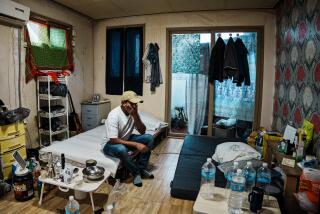South Koreans worry that foreign woes will hit home
- Share via
SEOUL — Moments before jumping to his death from an office high-rise this week, a South Korean stockbroker sent text messages to several clients, apologizing for the losses their investments had taken during the worldwide downturn.
Though an isolated incident, the suicide suggests how worried some South Koreans are by economic woes in Europe and the United States. The Kospi, the country’s primary stock index, fell nearly 10% this week before inching upward Thursday.
Yet South Koreans, who experienced their own severe financial crises in 1997 and 2008, are wary. They are concerned about foreign investors selling off Korean stocks and bonds to meet cash shortages at home.
As a result of the global downturn, economists warn that the export-dependent nation may not meet its economic growth target of 4.5% this year. They worry about persistent inflation, and a high household debt level surpassing that of U.S. families before the housing meltdown.
Even the country’s mighty chaebols, the family-owned export-based conglomerates that for years have driven the South Korean economy, have not been immune to the downturn.
Samsung Electronics, a blue-chip stock known here as the “emperor’s share” for representing 10% of the nation’s stock market capital, took a nose dive this week, at one point losing nearly 30% of its value.
South Korea’s 100 richest men, most of them chaebol heads, lost $6 billion in personal assets, according to a website here that tracks the personal finances of chaebol families.
Finance Minister Bahk Jae-wan acknowledged public fear and urged caution.
“It is inevitable that a relatively small, open market economy like Korea will be rocked by global market volatility,” he said.
South Korea has learned from its own financial crises how to respond, Bahk said, adding that the government had rebuilt its foreign reserves and added 335,000 jobs in the last year.
“The ability of the country to respond to emergency situations has improved considerably,” he said.
But many aren’t convinced, saying that both the government and consumers are troubled by a growing debt burden.
“Korea recovered comparatively quickly from the last economic crisis thanks to sound budgets.... But the situation is different now,” read an editorial in the JoongAng Daily newspaper.
Individual South Koreans, experts say, suffer worse debt woes than even American consumers. Household debt here this year mushroomed to 146% of income, surpassing the high of 138% among U.S. households before the subprime mortgage crisis.
“The government spent recklessly for the last decade, and household savings rates are now among the lowest” in the 35 member nations of the Organization for Economic Cooperation and Development, according to the editorial.
Experts warn that any drop in interest rates made to spur the economy probably would encourage more household borrowing, worsening the debt cycle.
Consumer prices continue to rise, driven in part by heavy rainfall that hurt crops and drove up the prices of many fruits and vegetables. Core inflation, which includes volatile oil and food prices, rose 3.8% in July, the largest gain in 26 months.
Browsing the vegetable aisle of a crowded Seoul supermarket, Kim Sun-nma, a 61-year-old homemaker, complained of high prices.
“Of course, it’s really hard to make a decent living right now. I feel the inflation so clearly. But what can you do about it,” she groused, returning a cucumber to its stack.
“With what’s going on in the U.S., everything is so precious now. I’m concerned,” she said.
“But we have to try our best to make ends meet.”
--
Jung-yoon Choi of The Times’ Seoul bureau contributed to this report.
More to Read
Sign up for Essential California
The most important California stories and recommendations in your inbox every morning.
You may occasionally receive promotional content from the Los Angeles Times.










